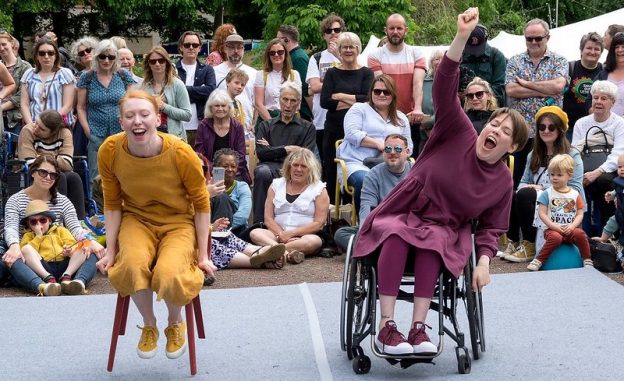Daryl Beeton is a Disabled director and performer who has worked extensively within the theatre, disability and young people’s arts sector for the last 25 years. At the core of his work is the belief that arts can enrich our lives and those of the communities we inhabit.
I’ve been Disabled since birth. I spent my childhood both in mainstream school and ‘special’ school which has impacted on how I’ve seen disability viewed by society.
As a Disabled child, there was no expectation that I would achieve much. There was a perception I wouldn’t work and would spend my life living at home with my family. Therefore at school there was no pressure on me to succeed in the traditional subjects such as Maths and English and I was allowed to do more ‘soft subjects’ such as the arts. I wouldn’t have been allowed to do this if I wasn’t Disabled. Being a Disabled person opened up the arts to me and therefore I wouldn’t be working in the arts today if I wasn’t Disabled.
I ended up taking a fairly mainstream route into the arts. I went to university and studied performing arts and spent most of my early career as a jobbing actor and workshop facilitator, and then directing. I’ve been an associate director for many different companies, and then artistic director at Kazzum for ten years, an Arts Council England National Portfolio Organisation back in the day.
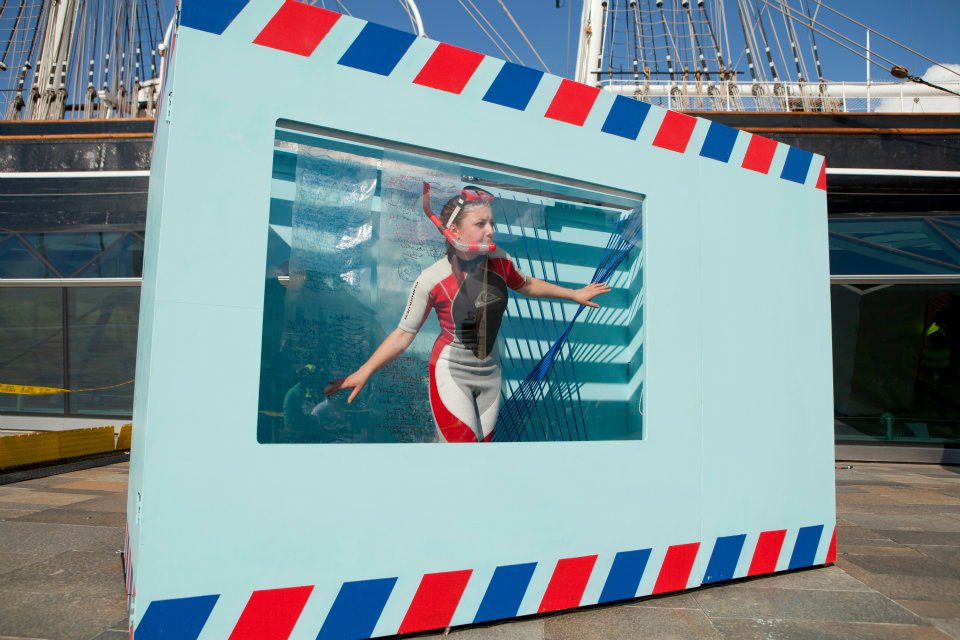
In 2018 I founded my own company, then imaginatively called Daryl Beeton Productions, but in 2022 the organisation was reimagined and renamed as Daryl & Co, to celebrate and underline the importance of our collaborators (including young people, artists, partners) to our work. To us, the ‘& Co’ is just as important as the ‘Daryl’.
Daryl & Co is a company where collaboration and co-creation meet mischief and merriment. Our vision is a world where Disabled artists and young people have unrestricted choices to creative experiences and careers. In recent years we have been proud to gain international audiences through our collaborations in Italy, Singapore and Japan. We deliver online inclusion seminars for the arts sector and we work with young people, artists and partners to develop new accessible, original and fun shows for young audiences.
We take fun seriously. Working nationally and internationally, we create colourful and entertaining children’s shows that challenge exclusion and champion equality. We are generous and playful in how we work.
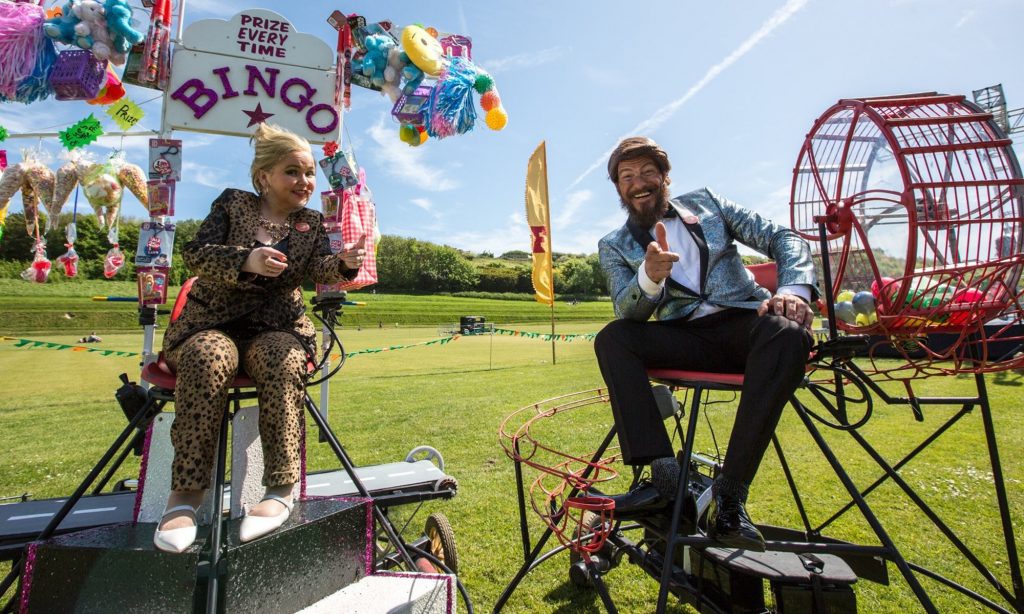
Back in February 2022 I took part in Broadening Our Horizons, an online roundtable discussion for the Total Theatre Artists as Writers programme. The question posed to us at the time was: ‘How can we support a broader and more inclusive and diverse theatre and performance landscape?’
The question itself, without saying it, had already defined what is perceived as the ‘mainstream’: those ideas, theatre and performances that are shared by most people and therefore regarded as ‘normal’, meaning inclusiveness and diversity are not seen as normal and we are seen as ‘other’, which for me is the main problem.
From my point of view, when I talk about inclusive or diverse I’m actually talking about opening up the mainstream to more people. It’s not separate, it’s not niche, we’re not taking away from it but we are adding to a rich tapestry of the arts.
Let’s be honest – the mainstream excludes! So therefore, how can it be mainstream if it actively excludes artists, participants and audiences from being involved. The problem with words like ‘inclusive’ is that they are defined by and seen through a cultural lens of tradition.
In 2019/20, just before the pandemic hit, we were working on a national strategic programme of work called A Different Way, working with seven strategic national partners to support the growth of Disabled-led theatre for young audiences.
The principle was simple and followed the ideology of ‘Nothing About Us Without Us’. It aimed to build knowledge of how to create work with, not for, young Disabled people. I’ve worked in theatre for young audiences for far too long and it is apparent to me that inclusion of Disabled people is still an issue. After 25 years in the sector, there still just aren’t that many Disabled people involved with the writing, production and touring of quality creative new theatre for young audiences. We wanted to change that. We wanted to normalise it and break the cycle of it being seen as niche and therefore not as important or mainstream.
We took a 360° approach by tackling access, representation and inclusion on a number of levels, beginning with including young Disabled people in the creation of new work. The voices, stories and experiences of young people formed the core of each production. The creative teams ran participatory workshops with the different age groups, experimenting with fresh ways of devising and developing themes, language and narratives together. This was complemented by a commitment to providing opportunities for talented Disabled performers, writers, directors and composers to be part of the creative teams to make original, inventive and authentic work which told a whole range of different stories led by Disabled people. Ultimately we wanted young Disabled people to see themselves and their experiences reflected and represented onstage, as part of the mainstream but told through our own cultural lens and to make it – well, normal!
Sitting outside of the mainstream is a unique position. For all its perceived negativity it’s actually a place of luxury, not of pity. It allows us to sit back to examine and observe the world around us; to question what we are seeing, and spotting the injustices. This unique view of life enriches my thinking, my creativity, and my approach to the rules we are made to play by. For me the usual rules don’t always apply, which means I have the luxury of improvising and making up my own.
In my world, disability politics and art are intertwined. Just by wheeling on stage as a Disabled person I am making a political act, I’m challenging someone’s perceptions before I do or say anything, so I may as well have fun with it.
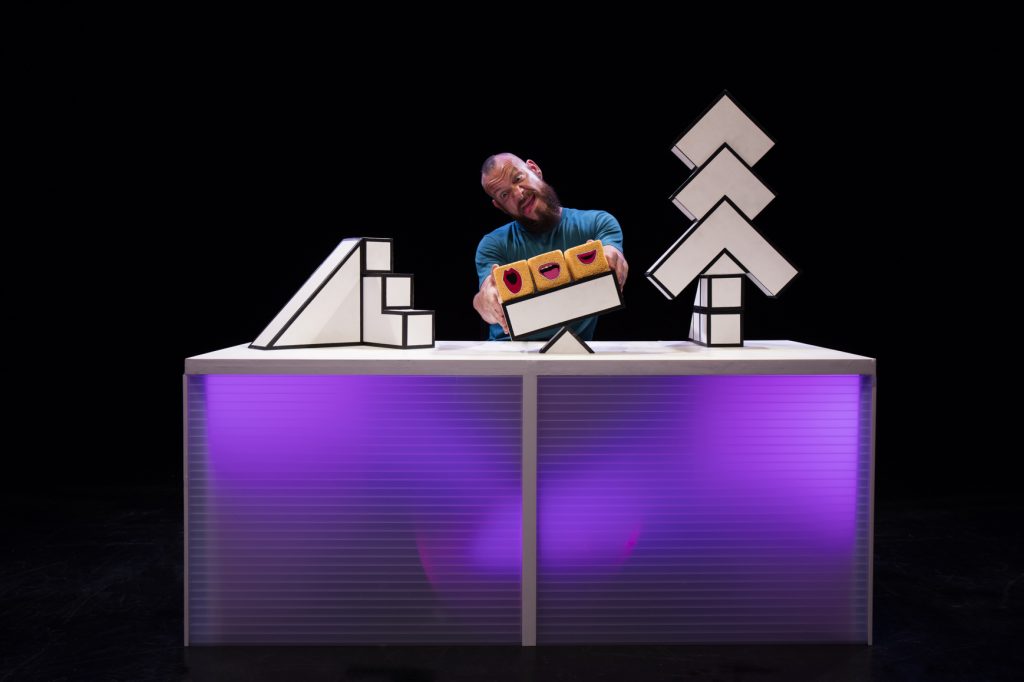
A good example of this is seen within one of our shows, A Square World. A show for 3–6 year olds. Created in 2017, it continues to tour both in the UK and internationally. It’s a show that looks at the unfairness of being left out in a world designed for everyone else but yourself. This non-verbal story uses clean-cut simple design, object manipulation, and elements of surprise to create an ever-evolving and imaginative world. A place where we discover anything can happen once we think differently and rip up the rule book.
A Square World is inspired by the ideas of the Social Model of Disability. It was created in collaboration with a class of 5-year-olds during an artist residency at a nursery. It presents the barriers of everyday life in a playful way, opening up an understanding and solidarity around disability without being didactic to our early years audience. The show doesn’t take a sledgehammer approach to the subject of access and inclusion, but doesn’t shy away from it either.
It may have been made for 3–6 year olds using the lived experience of being Disabled as a stimulus, but ultimately the themes of ‘feeling left out’ are universal – it’s beyond disability. Children’s Theatre Review described it thus: ‘The show is funny, quirky, assured and important. It’s almost impossible to watch anything at the moment without finding ways to relate it back to Brexit and Trump, but A Square World really is necessary theatre right now – though perhaps the audience it needs is one of adults rather than children?’
The majority of the work I experience is diverse-led (not the best term) and when I say ‘led’ I mean where the companies or creative teams are made up of at least 50% those who identify as Disabled, D/deaf, neurodivergent, queer, global majority, working class – and the intersectionality of all of the above and more… For me, this is mainstream! So often I see work celebrated as ‘representational’ and ‘diverse’ but the diversity is just with the performers on stage and not in the creative teams that made it.
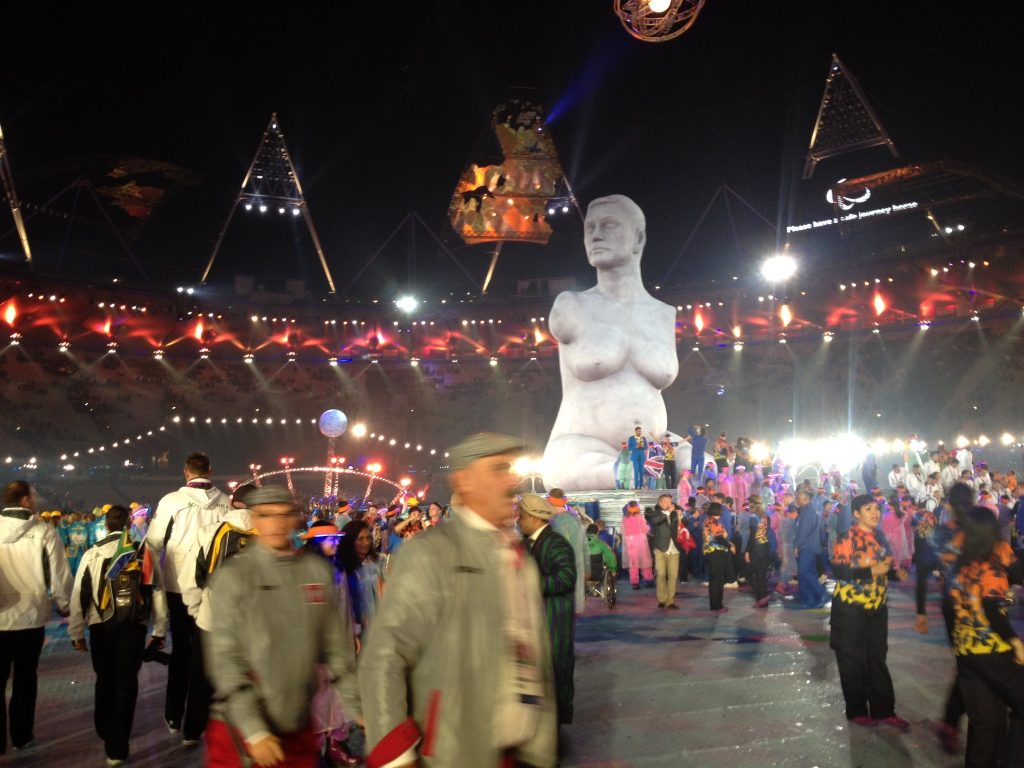
The best example of ‘inclusive theatre’ which I’ve worked on was the London 2012 Paralympic Opening Ceremony. I worked as part of the aerial team and got to fly about the stadium, which was great fun, but the show was political, had integrated access, was created and performed by vast teams of Disabled and non-disabled people, and was successful because the co-directors Jenny Sealey and Bradley Hemmings had spent the previous decades working with, supporting and programming Disabled-led work; so they came from a place of knowledge, understanding and experience. This was inclusive but it was also mainstream.
Of the 8 million people who watched the opening ceremony I’m sure no one thought. ‘Oh that’s a niche piece of inclusive theatre’. It wasn’t reviewed through a lens of pity: ‘Oh, didn’t they do well!’ Rather, it was seen as a great piece of theatre with universal themes which couldn’t have been made without Disabled and non-disabled creatives, both on- and off-stage.
When I first started making my own theatre, like many, I wanted to make work that was as good as the mainstream, but now we’ve evolved beyond that – we are making theatre that is beyond the mainstream. How are we doing this? By making theatre that is made by and for everyone.
We should be seizing opportunities to start new narratives, start new conversations with artists that are seen as ‘other ‘ – those artists who are off-centre and outside of the mainstream, who have been using every creative tool necessary to tell stories through different cultural lenses than our own.
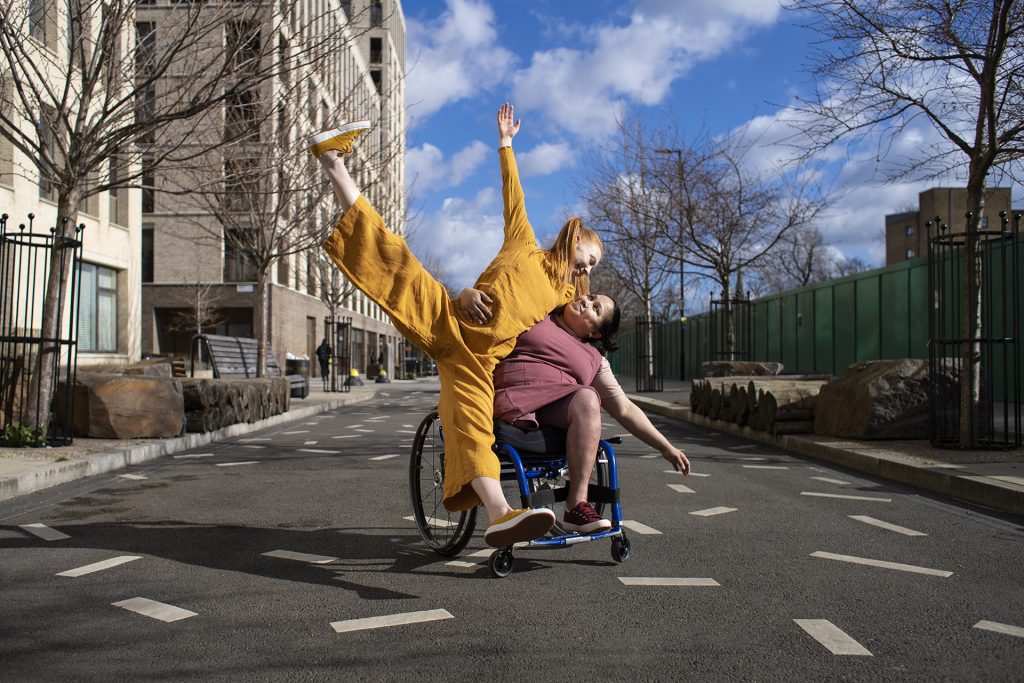
We currently have an outdoor show on tour – Look Mum, No Hands! – which is a co-production with Mimbre, a female-led company creating nuanced, breathtaking and highly-skilled acrobatic theatre. Our partnership came about through a mutual curiosity of who we wanted to collaborate with rather than searching out carbon copies of ourselves. Look Mum, No Hands! wouldn’t be the show it is without each other, each bringing our expertise, creativity and viewpoint of the world around us.
The performance takes creative advantage of the fact that one of the performers uses a wheelchair which has resulted in new acrobatic shapes and choreographies that are original and unexpected, not because we set out to do something different but because we had to. There was no handbook or established rules, so we made up our own. We turned this to our advantage, into a creative force that should be embraced because of its richness.
I know this article has focused on disability – that’s my cultural lens and I’m unapologetic about it – but it doesn’t mean that the work is exclusively for other Disabled people. You don’t have to be Disabled to feel left out, to explore independence, to laugh at yourself, to be political, and to call out the injustices in the world. These are the themes I explore in my work. They are universal but seen through a particular lens of lived experience.
Yet if we understand that Disabled people experience exclusion within the arts then we have to realise that exclusion of others because of their race, sexuality, gender, class, finances and so on are all born from the same attitudinal, emotional, organisational and traditional structures. Therefore, we are all bound up in the same fight. It goes beyond disability and is about our society as a whole.
It’s time to reclaim the mainstream and make a new centre-stage that everyone can enjoy. Without this, theatre will never really be for everyone. Instead, the mainstream will continue to be defined by tradition for generations to come.
So how can we support a broader and more inclusive and diverse theatre and performance landscape?
By tipping this outdated notion of what the ‘mainstream’ is on its head.
We are the mainstream!
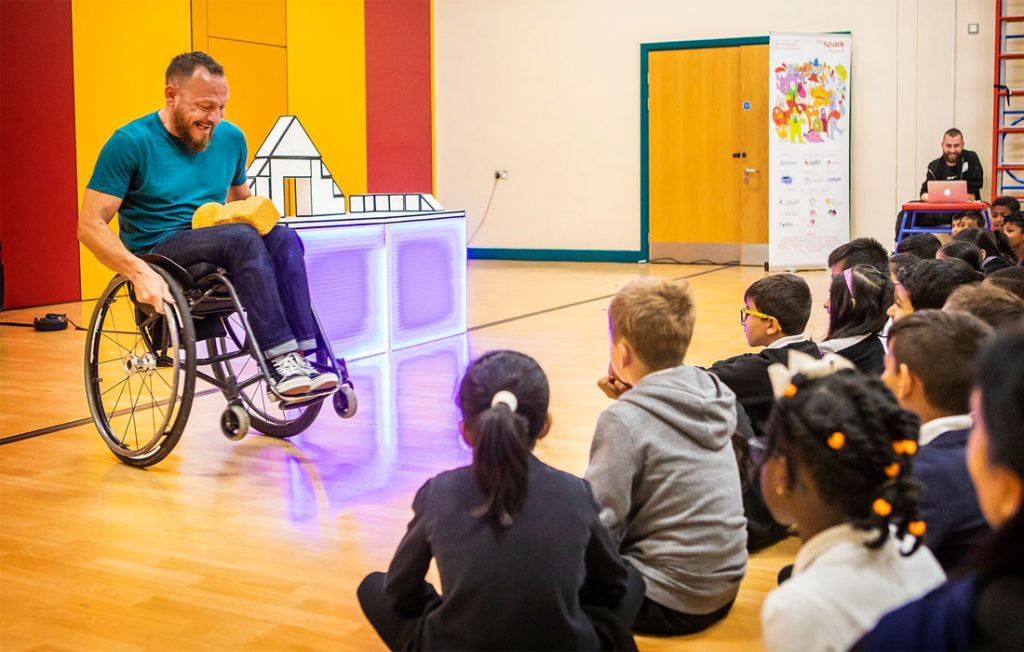
Featured image (top of page); Mimbre / Daryl & Co: Look Mum, No Hands! at the Norfolk & Norwich Festival 2022. Photo Sasa Astro sasastro.co.uk
Daryl Beeton is creative director of Daryl & Co. He has worked extensively within the theatre, disability and young people’s arts sector as a performer and director for the last 25 years. He is a recognised cultural leader in youth arts participation as well as a high-profile advocate for Disabled artists. The core of all of his work has been a belief that arts can enrich our lives and those of the communities we inhabit. Daryl is an active advocate for improving the rights of Disabled and vulnerable people by promoting access and inclusion within the arts.
Website: darylandco.com
Social media: @darylandco
More about the Total Theatre Artists as Writers Roundtable
Broadening Our Horizons was a 90-minute ‘roundtable on a square screen’ exploring how we can encourage critical writing for and about a more diverse theatre and performance sector. It was delivered in February 2022 as part of the Total Theatre Artists as Writers 2021-2022 programme. It was led by Total Theatre Magazine editor Dorothy Max Prior and associate editor Beccy Smith, together with a team of five guest speakers / workshop leaders: Daryl Beeton (Daryl & Co), Kane Husbands (The PappyShow), Laura Jones (Stopgap Dance Company), Anne Langford (freelance artist), Clive Lyttle (Certain Blacks). Each guest speaker made a presentation about their work, then speakers and participants worked together in breakout groups, addressing a selection of the key questions below, before coming back together for a final group discussion.
Some of the key questions explored:
How can Total Theatre Magazine and other publications and media outlets support a broadening and more inclusive and diverse (in every sense of that word) theatre and performance landscape?
What do artists working in physical/visual performance & circus/outdoor arts need most? Specifically, what do artists from less well represented communities/demographics need?
How do we best critique, celebrate and support work made by D/deaf and Disabled artists?
How do we critique performance work co-created in the community – i.e. work that isn’t traditionally reviewed?

